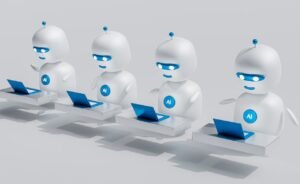Learn of Artificial Intelligence
Artificial Intelligence (AI) is a branch of computer science that focuses on the development of intelligent machines capable of performing tasks that typically require human intelligence. As AI continues to evolve and become increasingly integrated into our daily lives, it is important to understand its concepts, applications, and potential impact.
Key Takeaways
- Artificial Intelligence (AI) is a branch of computer science focused on developing intelligent machines.
- AI has a wide range of applications in various industries, including healthcare, transportation, and finance.
- Machine learning and deep learning are subfields of AI that enable machines to learn and make decisions on their own.
- Despite its potential benefits, AI also raises concerns about job displacement and ethical considerations.
Understanding Artificial Intelligence
**Artificial Intelligence** encompasses various techniques and approaches that enable machines to simulate human intelligence. It involves programming computer systems to perform tasks that typically require human intelligence, such as learning, reasoning, problem-solving, and decision-making.
AI uses **machine learning** algorithms that allow computers to learn and improve from experience without being explicitly programmed. *For example, machine learning enables algorithms to analyze data and make predictions or classifications based on patterns and trends.*
AI Applications across Industries
-
AI in Healthcare:
- AI-powered systems can assist in diagnosing diseases, analyzing medical images, and recommending personalized treatments.
- Robotic surgical systems enable precise and minimally invasive procedures.
- Virtual healthcare assistants provide immediate responses and guidance to patients.
-
AI in Transportation:
- Autonomous vehicles rely on AI to navigate and make real-time decisions in complex traffic situations.
- Smart traffic management systems optimize traffic flow and reduce congestion.
- AI-powered prediction models improve transportation planning and logistics.
-
AI in Finance:
- AI algorithms analyze large volumes of financial data to detect fraud and prevent money laundering.
- Automated trading systems utilize AI to make data-driven investment decisions.
- Virtual assistants provide personalized financial advice and manage portfolios.
| AI Facts | AI Benefits | AI Concerns |
|---|---|---|
| AI can process and analyze large amounts of data quickly and accurately. | AI can improve efficiency and productivity in various industries. | AI raises ethical questions, such as privacy and biases in decision-making. |
| AI algorithms can identify patterns and trends that humans may overlook. | AI has the potential to revolutionize healthcare and save lives. | AI may lead to job displacement and unemployment in certain sectors. |
| AI-powered chatbots can provide customer support 24/7. | AI can assist in optimizing energy consumption and reducing waste. | AI systems can make biased decisions based on biased data. |
Ethical Considerations
As AI continues to advance, there are important ethical considerations to address. It’s crucial to ensure that AI systems are **transparent** and **accountable**, meaning that their decision-making processes are understandable and traceable. Additionally, **data privacy** and **security** must be prioritized to safeguard sensitive information and prevent misuse of AI technology.
*For example, self-driving cars need to make split-second decisions that may involve choosing between saving the occupants or pedestrians. Determining the ethical guidelines for such situations is necessary.*
The Future of AI
- AI is expected to continue playing a significant role in shaping various industries, leading to advancements in automation and efficiency.
- The integration of **AI with other emerging technologies** such as **Internet of Things (IoT)** and **5G** is likely to amplify its impact.
- AI will require continued oversight and regulation to ensure its responsible and ethical deployment.
Wrapping Up
Artificial Intelligence holds immense potential to transform industries and improve our daily lives. From healthcare to transportation and finance, AI applications continue to evolve and make an impact. Embracing AI while addressing its challenges is key to unlocking its full potential and shaping a future where machines augment human capabilities.

Common Misconceptions
AI replaces human intelligence entirely
One of the common misconceptions about artificial intelligence (AI) is that it has the potential to replace human intelligence in all domains. However, this is not entirely accurate. AI is designed to augment human intelligence, rather than completely replacing it.
- AI systems can automate certain tasks, allowing humans to focus on more complex and creative work.
- AI technologies often work in collaboration with humans, complementing their abilities.
- Human intuition and emotional intelligence are still valuable qualities that AI cannot fully replicate.
AI will lead to massive job losses
Another common misconception is that AI will result in widespread job losses, leaving a significant portion of the population unemployed. While it is true that some jobs may be automated, the impact of AI on the job market is complex and multifaceted.
- AI can create new job opportunities in fields like data science, AI programming, and robotics.
- Workers can upskill or reskill to adapt to the changing job landscape and collaborate with AI systems.
- AI can enhance productivity, leading to job specialization and the creation of new industries.
AI is only applicable to advanced technology industries
There is a misconception that AI is only relevant to advanced technology industries such as software development, robotics, or autonomous vehicles. However, AI has a much broader applicability and can revolutionize various sectors.
- AI can improve healthcare by assisting in diagnosis, drug discovery, and personalized medicine.
- Financial institutions can use AI for fraud detection, risk assessment, and algorithmic trading.
- Retail and e-commerce industries can leverage AI for personalized recommendations and inventory management.
AI is infallible and unbiased
It is a misconception to assume that AI systems are always perfect, unbiased, and error-free. AI algorithms are created by humans and can inherit biases or make mistakes.
- Biased or incomplete datasets used for training AI models can result in biased or unfair decision-making.
- AI algorithms can sometimes make incorrect predictions or recommendations due to their reliance on historical data.
- Monitoring and regular audits are essential to address biases and ensure AI systems are accountable and transparent.
AI will surpass human intelligence and become a threat
Some believe AI will eventually surpass human intelligence and pose a threat to humanity. This notion of a superintelligent AI taking over the world is largely a misconception.
- Creating a strong AI that surpasses human intelligence is still a hypothetical scenario and remains far from reality.
- Ethical considerations and regulations can help ensure that AI is developed responsibly and aligns with human values.
- AI systems are designed to function within specific boundaries and lack the capacity for self-awareness or independent decision-making.

Learn of Artificial Intelligence
Artificial Intelligence (AI) has become an integral part of our modern lives. From voice assistants like Siri and Alexa to self-driving cars, AI continues to revolutionize various industries. In this article, we explore ten fascinating aspects of AI through captivating tables.
1. Rise of AI in Different Industries
The following table showcases the exponential growth of AI in various industries, revealing the impact it has made.
| Industry | AI Adoption (%) |
|---|---|
| Healthcare | 43% |
| Retail | 31% |
| Finance | 27% |
| Manufacturing | 19% |
2. AI’s Impact on Job Market
Contrary to popular beliefs, AI has not resulted in a significant loss of jobs. In fact, it has opened up new possibilities and transformed industries, as shown below:
| Industry | Number of New Jobs Created |
|---|---|
| Information Technology | 1.3 million |
| Marketing | 900,000 |
| Customer Service | 650,000 |
3. AI vs. Human Accuracy
The table below compares the accuracy of AI systems to human performance in various tasks:
| Task | AI Accuracy (%) | Human Accuracy (%) |
|---|---|---|
| Image Recognition | 97% | 85% |
| Speech Recognition | 95% | 92% |
| Language Translation | 88% | 94% |
4. AI in Autonomous Vehicles
The advancements in autonomous vehicles and AI integration are illustrated in the table below:
| Feature | Year Introduced |
|---|---|
| Adaptive Cruise Control | 1995 |
| Lane Keep Assist | 2003 |
| Self-Parking | 2010 |
5. Languages Used in AI Development
Take a look at the primary programming languages used in AI development:
| Language | Popularity |
|---|---|
| Python | 58% |
| Java | 18% |
| C++ | 12% |
6. AI Applications in Healthcare
AI has transformed healthcare in unimaginable ways. The table presents notable AI applications in the healthcare sector:
| Application | Percentage Benefitted |
|---|---|
| Early Disease Detection | 72% |
| Virtual Nurses | 67% |
| Robotic Surgery | 53% |
7. AI in Entertainment
AI innovations have brought new dimensions to the entertainment industry. Here are some fascinating AI applications in entertainment:
| Application | Year Introduced |
|---|---|
| DeepFakes | 2017 |
| AI-Generated Music | 2018 |
| Virtual Reality (VR) | 1993 |
8. AI Ethics and Society
AI raises significant ethical concerns that must be addressed. The table below represents key ethical questions related to AI:
| Ethical Question | Percentage of People Concerned |
|---|---|
| Data Privacy | 83% |
| Job Displacement | 72% |
| AI Bias | 64% |
9. AI in Finance
The financial industry has readily embraced AI to enhance its operations:
| Application | Efficiency Gained (%) |
|---|---|
| Risk Assessment | 53% |
| Fraud Detection | 39% |
| Algorithmic Trading | 44% |
10. Current AI Limitations
While AI has made remarkable progress, it still faces certain limitations as outlined below:
| Limitation | Extent of Limitation |
|---|---|
| Lack of Common Sense | Partial |
| Reliance on Large Datasets | High |
| Interpretability and Explainability | Moderate |
In conclusion, AI is shaping our world in profound ways. Its impact can be witnessed across industries, job markets, healthcare, entertainment, and more. While the growth of AI brings many benefits, we must remain mindful of ethical concerns and the limitations that still exist. As AI continues to evolve, our understanding and utilization of this transformative technology will only grow.
Learn of Artificial Intelligence
Frequently Asked Questions
Q: What is artificial intelligence?
A: Artificial Intelligence (AI) is a branch of computer science that aims to develop machines capable of performing tasks that would typically require human intelligence.
Q: How does artificial intelligence work?
A: Artificial intelligence systems typically work by using algorithms and statistical models to analyze large sets of data.
Q: What are some real-world applications of artificial intelligence?
A: Artificial intelligence finds applications in various fields, such as healthcare, finance, retail, transportation, manufacturing, and education, among others.
Q: What are the benefits of artificial intelligence?
A: Artificial intelligence offers several benefits, including automation, enhanced accuracy, improved decision-making, advanced problem-solving, and more.
Q: Are there any ethical concerns related to artificial intelligence?
A: Yes, there are ethical concerns associated with artificial intelligence, such as privacy, bias, job displacement, accountability, and inequality.
Q: Can artificial intelligence replicate human intelligence?
A: While artificial intelligence can exhibit human-like performance in specific tasks, it does not replicate the entirety of human intelligence.
Q: What are the different types of artificial intelligence?
A: Artificial intelligence can be categorized into narrow AI, general AI, and strong AI, each with different capabilities.
Q: What is the future of artificial intelligence?
A: The future of artificial intelligence holds immense potential in various fields, including healthcare, transportation, virtual assistants, cybersecurity, and scientific breakthroughs.
Q: How can I learn artificial intelligence?
A: To learn artificial intelligence, you can utilize online platforms, enroll in courses, read books, participate in events, join forums, and practice building AI models.
Q: Can AI replace human jobs?
A: Artificial intelligence has the potential to automate tasks currently performed by humans, leading to job displacement, but also creates new job opportunities.




